新视野商务英语(下)Unit 8
- 格式:ppt
- 大小:1.12 MB
- 文档页数:9
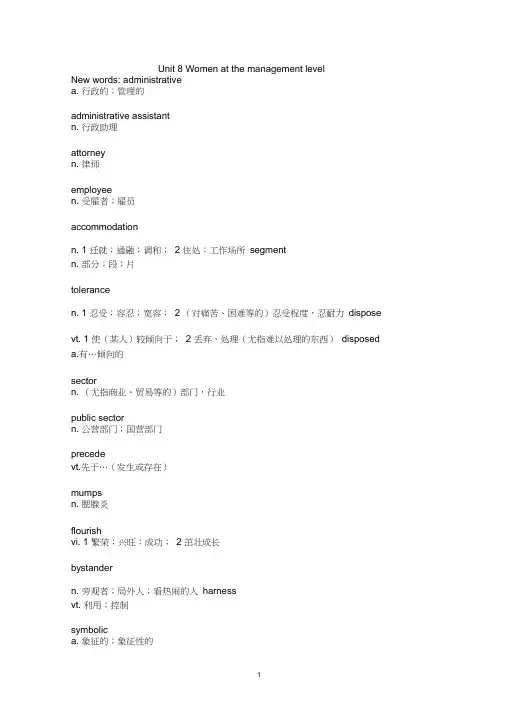
Unit 8 Women at the management levelNew words: administrativea. 行政的;管理的administrative assistantn. 行政助理attorneyn. 律师employeen. 受雇者;雇员accommodationn. 1 迁就;通融;调和;2 住处;工作场所segmentn. 部分;段;片tolerancen. 1 忍受;容忍;宽容;2 (对痛苦、困难等的)忍受程度,忍耐力disposevt. 1 使(某人)较倾向于;2 丢弃,处理(尤指难以处理的东西)disposed a.有…倾向的sectorn. (尤指商业、贸易等的)部门,行业public sectorn. 公营部门;国营部门precedevt.先于…(发生或存在)mumpsn. 腮腺炎flourishvi. 1 繁荣;兴旺;成功;2 茁壮成长bystandern. 旁观者;局外人;看热闹的人harnessvt. 利用;控制symbolica. 象征的;象征性的plausiblea. 可能正确的;有道理的hierarchicala. 按等级划分的diplomatica. 1 讲究手腕的;灵活变通的;2 外交的;从事外交工作的diplomaticallyad. 讲究手腕地;灵活变通地;外交地discriminationn. 歧视petroleumn. 石油exportn. 出口v. 出口acren. 英亩countyn. (英国的)郡;(美国等国家的)县erecta. 直立的;垂直的vt. 竖起cashiern. 出纳员;收银员auctionn. 拍卖concessionn. 妥协;迎合marinea. 海洋的;海产的;海生的n. 水兵;(英国/美国)海军陆战队士兵extentn. 程度;限度;范围viceprefix 表示“副”(用于高级职位的名称前,表示仅次于这个职位的职位)weaponn. 武器;兵器;凶器infervt. (根据资料)推断,退定violatevt. 1 打扰;侵犯;侵害;2 违背;违反;侵犯valida. 1 有根据的;令人信服的;2 有效的;正式认可的offensen. 得罪;冒犯行为veilvt. 遮盖;掩饰n. 面纱composevt. 1使自己镇静下来;2由…组成composeda. 镇静的;镇定的headquartersn. 部;总公司;总办事处identicala. 完全相同的;非常相似的cooperativea. 合作的contextn. 1 场合;周围情况;环境;背景;2 上下文;语境scanvt. 1 扫描;2 粗略地看;浏览disputen. 争论;辩论;争端;纠纷consultantn. 顾问vaguea. 含糊的;不明确的;不清楚的vaguelyad. 1 模模糊糊地;不明确地;2 稍微;有点Phrases and expressions:be disposed to do sth. 愿意做某事;乐于做某事on both counts 在两个方面take over 接管;接任;接受take a liberty / liberties with sb. 与某人相处时太放肆feel at ease with sb. (与某人在一起)感到放松,不拘束make a concession / concessions to 为对某事或某想法取得一致意见作出妥协to some extent 在某种程度上come down to 归结为burst into 突然迸发(尤指开始唱歌、哭、笑等)take exception to sth. 因某事而生气(烦恼)stem from源于;来自;由于…发生Women at the management level1 When Monica applied for a job as an administrative assistant in 1971, she was asked whether she would rather work for a male or a female attorney. "I immediately said a man," she says. "I felt that a male-boss/female-employee relationship was more natural, needing no personal accommodation whatsoever." But 20 years later, when she was asked the same question, she said, "I was pleasantly surprised that female bosses are much more accessible to their employees; they're much more sensitive and intimate with their employees."2 Female bosses today are still finding they face subtle resistance. There is still a segment of the population, both men and, surprisingly, women who report low tolerance for female bosses. The growing presence of female bosses has also provoked two major questions that revolve around styles: Do men and women manage differently, and, if so, is that a good thing?3 Monica is disposed to think so, on both counts. Now a 40 -year-old mother of four, she is president of a public sector labor union with 45,000 members. "Relations with my employees are probably different from those of male managers preceding me," she says. "I know what it's like to have to call and say my kid got the mumps so I won't be coming in. I have a more flexible style —not soft, just more understanding." The manwho is Monica's assistant agrees, "She tends to delegate more and is always looking for a consensus. People are happy and flourish because they have an input into decisions and they are not mere bystanders; their energies are harnessed. On the other hand, consensus takes longer."4 So, are the differences symbolic or real? Plausible studies suggest that men are typically hierarchical, goal-oriented and feel entitled. Women, by contrast, managediplomatically, and share power. That point of view is often challenged and argued. Some proclaim that men and women of similar backgrounds, experience and aspirations basically manage in the same way. This view is echoed by younger women, especially those who have encountered little gender discrimination. That was certainly the lesson for Nicole. When her father died of a heart attack, she was an employee at a petroleum products export company. She quit and took over her family's 160-acre fruit farm in St. David's County. On her first day in the field, a worker called her "darling". "He was trying to test me. I was shaking with anger," says Nicole, now 34. "I stood erect and said, 'You wouldn't have called my father darling and you're not going to take that liberty with me. If you do, I'll fire you.'"5 When women work for women, a different dynamic often takes over. Susan, a cashier in a Toronto auction house, says that she has explored friendships with some of her female bossesand feels she can rely on them more. While women may feel more at ease with a female boss, men often have to make concessions to the new working styles. Brian, a marine biologist, says, "It took me a couple of years before I felt comfortable enough to relax around a female manager. In fact,my relations with her were much more businesslike."6 To some extent, the male-female differences come down to conflicting styles. One female vice-president discussed the time she burst into tears during a meeting. "Men think that tears are a nuclear weapon in a conventional war. They take exception to a woman crying, inferring that she's feeling unhappy or violated." The men failed to understand that what prompted her tears was not hurt but genuine rage. "When we cry, it's because we have all this valid rage that has no appropriate release," she says. "Women cry; men get relief by going on with the offense or by veiling their feelings to appear composed."7 Deborah, president of a firm with its headquarters in Toronto, says that even if men do understand, they sometimes react differently to the identical information and to her cooperative management style.8 Deborah says that her authority is sometimes undermined by perceptions about her gender. "It stems from the whole social context of traditional roles for men and women," she says. "Mom would tell you to do things, but perhaps you wouldn't take as much notice as when Dad told you to do things. Men also have a stronger urge to control," she says.9 For female bosses,the great expectation of some female employees is one more obstacle. Junior women assume a female boss will promote them more quickly than a man would. But, they also expect female bosses to be more se-lsfufficient. "They ask, 'Why can't you scan your own stuff?' or 'Why can't you do your own filing?'" says one senior female executive.10 On the other hand, there is no dispute that a few decades ago they would rarely have had a female boss in the workplace. Nina, a management consultant says she's vaguely optimistic. "I'm looking forward to the day, before I die, when we recognize that the best management styles will be composed of the best that both genders bring to the table ..." Well, she pauses, maybe not before she dies, perhaps in her daughter's lifetime.当莫妮卡1971 年申请一个行政助理的工作时,有人问她想与男律师共事还是与女律师共事。

新视野商务英语视听说unit8答案1、If you want to _______, you’d better eat more healthy food and do more exercise. [单选题] *A. keep fatB. keep calmC. keep healthy(正确答案)D. keep on2、10.﹣Could you please sweep the floor?I’m going to cook dinner.﹣__________.I’ll do it at once,Mom.[单选题] *A.I’m afraid notB.You’re kiddingC.It’s a shameD.My pleasure(正确答案)3、This is _________ my father has taught me—to always face difficulties and hope for the best. [单选题] *A. howB. whichC. that(正确答案)D. what4、There is not much news in today's paper,_____? [单选题] *A. is itB. isn't itC.isn't thereD. is there(正确答案)5、( ) .Would you please ______me the gifts from your friends? [单选题] *A.to showB. showingC. show(正确答案)D. shown6、—______ do you play basketball?—Twice a week.()[单选题] *A. How often(正确答案)B. How muchC. How manyD. How long7、Can you tell me how the accident _______? [单选题] *A. came about(正确答案)B. came backC. came downD. came from8、—Tony, it’s cold outside. ______ wear a jacket?—OK, mom.()[单选题] *A. Why not(正确答案)B. Why don’tC. Why did youD. Why do you9、Mum, this T-shirt is much too small for me. Would you buy me a _______ one? [单选题] *A. niceB. largeC. nicerD. larger(正确答案)10、I have a _____ every day to keep fit. [单选题] *A. three thousand meter walkB. three-thousands-meters walkC.three-thousand-meters walkD. three-thousand-meter walk(正确答案)11、Its’time to go to bed. _______ your computer, please. [单选题] *A. Turn onB. Turn inC. Turn off(正确答案)D. Turn down12、His father always _______ by subway. [单选题] *A. go to workB. go to schoolC. goes to bedD. goes to work(正确答案)13、What did you _______ at the meeting yesterday? [单选题] *A. speakB. tellC. say(正确答案)D. talk14、I didn't hear _____ because there was too much noise where I was sitting. [单选题] *A. what did he sayB. what he had said(正确答案)C. what he was sayingD. what to say15、--What would you like to say to your _______ before leaving school?--I’d like to say"Thank you very much!" [单选题] *A. workersB. nursesC. waitersD. teachers(正确答案)16、———Must I return the book you lent me to you now? ——No, you( ). You can keep it for another few days. [单选题] *A.can’tB. shouldn'tC. mustn'tD. don, t have to(正确答案)17、Mr. Wang is coming to our school. I can’t wait to see _______. [单选题] *A. herB. him(正确答案)C. itD. them18、What’s your _______ for the coming new year? [单选题] *A. playB. plantC. plan(正确答案)D. plans19、Don’t _______ to close the door when you leave the classroom. [单选题] *A. missB. loseC. forget(正确答案)D. remember20、--The last bus has left. What should we do?--Let’s take a taxi. We have no other _______ now. [单选题] *A. choice(正确答案)B. reasonC. habitD. decision21、He always found it hard to satisfy himself. [单选题] *A. 控制B. 满足(正确答案)C. 了解D. 批评22、You can _______ Bus 116 to get there. [单选题] *A. byB. take(正确答案)C. onD. in23、Bob used ______ on the right in China, but he soon got used ______ on the left in England.()[单选题] *A. to drive; to driveB. to drive; drivingC. to driving; to driveD. to drive; to driving(正确答案)24、85.You’d better? ? ? ? ? a taxi, or you’ll be late. [单选题] *A.take(正确答案)B.takingC.tookD.to take25、If people _____ overanxious about remembering something, they will forget it. [单选题] *A. will beB. would beC. wereD. are(正确答案)26、--Could you please tell me _______ to get to the nearest supermarket?--Sorry, I am a stranger here. [单选题] *A. whatB. how(正确答案)C. whenD. why27、Hurry up,?or we’ll _______ class. [单选题] *A. be late for(正确答案)B. late forC. late withD. be late with28、She _______ love cats, but one attacked her and she doesn’t like them anymore. [单选题]*A. got used toB. was used toC. was used forD. used to(正确答案)29、81.Some birds are flying ________ the lake. What a beautiful picture! [单选题] *A.forB.underC.inD.above(正确答案)30、3.Shanghai is my hometown. It’s ________ China. [单选题] *A.nearB.far away fromC.to the east ofD.in the east of(正确答案)。
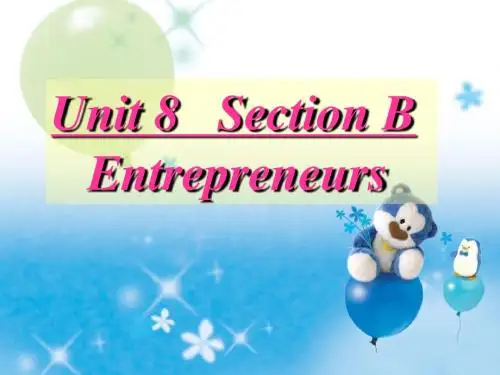
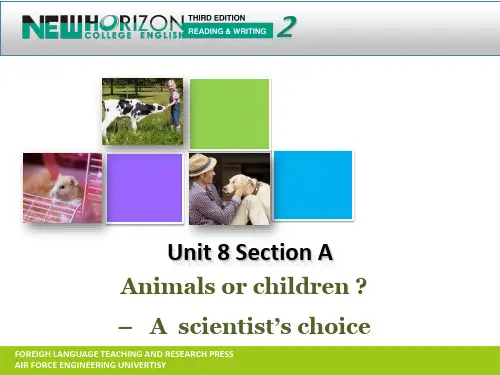

新视野视听说第二册第八单元答案Task 1Unit 1 Unit 2 Unit 3 Unit 4 Unit 5 Unit 6 Unit7 Unit 8 Unit 9Unit 10Task 1 Task 2Task 3Task 1 Task 2Task 3Further listening 1 Further listening2Further listening 3Further speaking 1Unit 8 Crime does pay!Done with this task.Your currentscore: 88%Unit 8 testNextDirections: Click on the speaker to the left tstart playing the audio recordings for PartsI II and III. They will be played continuouslyOnce the recording starts playing, please do N clickon either the speaker icon or the 'UniQuiz' link in the menu bar above. Otherwise,yoPart I may lose the chance of hearing the complet recording.ScriptDirections: Listen to the short dialogs, andthen choose the correct answers to the questions. You will hear the recording twice.After the first playing, there will be time for you to choose the correct answers. Use the second playing to check your answers.(Listen to the audio recording for the1.question.)A. Warning the woman against walkingalone at night.B. Offering to walk back with the woman.C. Saying goodbye to the woman.D. Telling the woman to be on guard.(Listen to the audio recording for the2.question.)A. The woman's book is stolen.B. The woman steals the book.C. The man supports piracy.D. The man tries to persuade the womannot to buy pirated books.(Listen to the audio recording for the3.question.)A. She hopes to get back her laptop ( 笔记本电脑 ).B. She hopes to catch the thief.C. She hopes Steve will get overhis rage.D. She hopes Steve will get somecompensation.(Listen to the audio recording for the4.question.)A. To tell the children who is thecriminal.B. To keep the children stay at homeall the time.C. To encourage children to ask forpermission before playing outside thehouse.D. To tell children not to open doorsfor strangers until they get the name of thestranger.(Listen to the audio recording for the5.question.)A. The man is for harsh punishmentswhile the woman is against them.B. The womanis for harsh punishmentswhile the man is against them.C. They are both in favor of harshpunishments.D. They are both against harshpunishments.Part II ScriptDirections: Listen to the following recording, and then fill in the blanks with the missingwords. You will hear the recording twice. After the first playing, there will be time to writethe missing words. Use the second playing to check your answers.W: What do you think about your life here(1)in prison?M: Well,it's not too bad. I spend(2)the greater part of my time in an 8x10 cell ( 囚室), and you spend most of your time in a6x8(3)small office.way ofW: That's a funny looking at (4)things. M: Here I get(5)3 meals a day. There inthe office you (6)get a break for one meal and you have to pay for it.W: You're getting more interesting.M: In prison I can watch TV and(7)play games.At work you (8) get fired for watching TV and playing games.W: Go on. I'm (9).M:Here in prison they(10)allow my family and friends to visit. In the office youcan't even speak to your family and friends(11). Now would you like to(12)with me?W: (13)I wouldn't.what you've said, I'm afraidYour Correctanswer answer(1)in in prison prison the the(2)greater greaterpart of part ofall ears(3)small small office office(4)things thingsthree(5) 3 meals meals/3meals(6)get a get a break break(7)play play games games(8)get get fired fired(9)all all ears ears(10)allow allowon the (11)phone(12)change placesIn(13)spiteofPart III ScriptDirections:Listen to the following recording, and then choose the correct answers to the questions. You will hear the recording twice.After the first playing,there will be time for you to choose the correct e the second playing to check your answers.1.What is the dialog mainly about?A.The man tells the woman aboutthe mugging he experienced.B.The woman tells the man aboutthe mugging she experienced.C.The woman tells the man about themugging her friend experienced.D.The woman advises the man notto commit mugging.2.What did the woman lose in the mugging?A.Her trust in men and week's pay.B.MasterCard, Visa card and 66 dollars.C.Her ID, Visa card and 60 dollars.D.Her sense of humor and fear of thedark.3.When was the woman robbed?A.Just before dawn in a dark alley.B.At sunset on the sunny side of thestreet.C. In broad daylight in a parking lot.D. In the park during the day.4.What can we learn from the woman'sdescription of the mugger?A. He is about 170 cms tall andunusually fat.B. He is a teenager with pale-blue eyes.C. He is a tall, strong young man.D. He is short, with brown eyes.5. What does Jackie hope will happen to themugger?A. He spends the remaining yearsof his life in prison.B. He reforms and becomes a usefulcitizen.C. He apologizes to her next time theymeet in the park.D. He locks up his apartment at night.Part IVDirections: Choose the best answer to each ofthe following statements.1.I was walking home from work when thiswoman ______ me right ____ my feet.A.knocked...awayB.knocked...offC.hit...awayD.struck...of2. I'll just take off my left shoe _________I walk through the park.A. every timeB. every time whenC. in every timeD. in every time when3.Many months had ______ and theborder guard met the young man again.A.gone offB.gone awayC.gone byD. gone through4.The border guard asked the young man, "Just____________, what were you smuggling?"A.between me and youB.between you and meC.to tell meD.from you to me5.Blake wiped his hands ______ his cleanjeans before shaking hands.A.inB.atC.onD.through6.He told the police that Pete lived _____away.A. two doorsB. in two doorsC. at two doorsD. for two doors7.The officer could see that Kenny's yard_____ the victim's.mandedmanded overC.looked overD.overlooked8. The 91-year-old man was accused of_______ the bank.A.robbingB.robbing fromC.robbing inD.robbing with9.In 1999 the old man ____ a three-yearsentence for bank robbery in Florida.A.served forB.servedC.serviced forD.serviced10. A witness ______ the criminal's licensenumber of his car.A. took onB. took overC. took inD. took down8278Submit??Search onlinWord tipsLanguage and culture tipsOverviewLearning strategiesScriptQuestion 1W:See you guys next week, I'mgoing home now.M: Let me walk you back. It's on my wayanyway. It's dangerous for awoman to be walking alone at night. Q: What is the man doing?Question 2W: Lookbook.at the poorThere are a lotquality ofof mistakestheinit!M: You must have bought a pirated Book piracy is a violationintellectual property rights, youshouldn't support such kind ofstealing act.one.ofsoQ: What can we infer from the dialog? Question 3M:I spoke to Steve yesterday. His flat was broken into. TV, DVD player,stereo, laptop, digital camera—allgone. He's really mad.W: I would be too. That's terrible! Ihope he can claim it on the insurance.Q: What does the woman hope for? Question 4W:I attended a lecture on "Safety for Children" in the community lastnight.A professorsaid thatparents should always encouragechildren to ask for permission beforeleaving the house. Besides, parentsshould tell the children not to opendoors to the strangers.M: Absolutely.But I think more importantly they should be taughtto stay away from the strangers.Q:What can parents do to keep children safe?Question 5M: I think that if a country is too softon its criminals,crime willincrease.W:But it's also a fact that severepunishment has never stopped crime. Q:What do the man and woman think about dealing with crime?ScriptW:What do you think about yourlife here (in prison)?M: Well,it's not too bad. I spend (the greater part of) my time in an 8x10cell ( 囚室 ), and you spend most ofyour time in a 6x8 (small office).W:That's a funny way of lookingat (things).M:Here I get (three meals) a day. There in the office you (get a break) for one meal and you have to pay for it.W: You're getting more interesting.M: I n prison I can watch TV and (play games). At work you (get fired) forwatching TV and playing games.W: Go on. I'm (all ears).M: Here in prison they (allow)my family and friends to visit.In theoffice you can't even speak to yourfamily and friends (on the phone).Now would you like to(changeplaces) with me?W:( In spite of) what you've said, I'm afraidI wouldn't.ScriptM:Jackie, you look as though you've seen a ghost? What's the trouble?W: He came right at me...I was so frightened...M: Slow down. Are you okay?W:Yeah. Let me catch my breath. I was just mugged.M: My god! Are you hurt?W: No, I'm fine, but he took my wallet with 60 dollars in it.M: Where did it happen?W:Just down on the path through the park. In broad daylight, too!M:Did you have credit cards or anything else in your wallet?W: I t had my Visa and school ID.M:We should call the police and thecredit card company right away. Didyou get a good look at the guy? Couldyou describe him to the police?W: Not really.He had a scarf pulled up to cover his face.M:Anything else about him? Eyes? Height?W: All I could see was a pair blood-shot brown eyes. And short, about 160 cms. That's not much help, isit?of he'sM:You did well to remember anything, and those details could help thepolice track him down.W:I hope they catch him and lock him up for life.。

新视野三版读写B2 U8 Text AAnimals or children? — A scientist's choice1 I am the enemy! I am one of those cursed, cruel physician scientists involved in animal research. These rumors sting, for I have never thought of myself as an evil person. I became a children's doctor because of my love for children and my supreme desire to keep them healthy. During medical schooland residency, I saw many children die of cancer and bloodshed from injury —circumstances against which medicine has made great progress but stil has a long way to go. More importantly, I also saw children healthy thanks to advances in medical science such as infant breathing support, powerful new medicines and surgical techniques and the entire fieldof organ transplantation. My desire to tip the scales in favor of healthy, happy children drew me to medical research.*2M y accusers have twisted the truth into a fable and cast me asthe devil. They claim that I have no moral compass, that I torture innocent animals for the sole purpose of career advancement, and that my experiments have no relevance to medicine.Meanwhile, an uncaring public barely watches, convinced that the issue has no significance,and publicity-conscious senators and politicians increasingly give way tothe lobbying of animal rights activists.3 We, in medical research, have also been unbelievably uncaring. We haveal owed the most extreme animal rights protesters to creep in and frame the issue as one of "animal fraud" and hatred. We have persisted in our belief that a knowledgeable public would consent to the importance of animal research for public health. Perhaps we have been mistaken in not responding to the emotional tone of the argument. Perhaps we should have responded to those sad slogans and posters of animals by waving equal y sad posters of children dying of cancer or external wounds.4 In the animal rights forum, much is made of the volume of pain these animals experience in the name of medical science.Activists deny that we are trying to help and say it is evidence of our evil and cruel nature. A more reasonable argument, however, can be advanced in our defense. Life is often cruel to animals and human beings. Teenagers are flung from trucks and suffer severe head injuries. Young children barely able to walk find themselves at the bottom of swimming pools while a parent is occupied with something else. Fromeveryday germs to gang violence, no life is free of pain. Physicians hoping to relieve the eternal suffering of these tragedies have only three choices: 1) create an animal model of the problem to understand the process and test new therapies; 2) experiment on human beings (some experiments wil succeed, most wil fail); or 3) leave medical knowledge static, hoping that accidental discoveries wil lead us forward.5 Some animal rights activists would suggest an optional fourth choice,*******claiming that computer models can create a nimal experiments,thus omitting actual experiments. Computers can imitate the effects ofwel -understood principles on complex systems, as in the application of the laws of physics to airplane and automobile design. However, when the principles themselves are in question, as is the case with the complex biological systems of human life under study, computer modeling alone is of little value.6 One of the terrifying effects of arresting the use of animals in medical research is that the impact wil not be felt for years or even decades. Drugs to cure infection wil remain undiscovered, surgical and diagnostic techniques wil remain undeveloped, and fundamental biological processes that might have been understood wil remain mysteries. There is the danger that quick decisions by wel -meaning politicians wil create resolution to diplomatical y satisfy the smal minority of loud protesters while the consequences and damaging impact of those decisions wil not be apparent until long after.7 Fortunately, most of us enjoy good health, and the agony of watching one's child die has become a rare experience. Yet our good fortune should not make us unappreciative. Protection from serious sickness and drugs to combat heart *disease, high blood pressure and stroke are al based on animal research. Most complex surgical procedures such as heart or hip surgery and organ transplantation surgeries were initial y developed in animals. Techniques to replace defective genes, the cause of so much disease, as wel as the development of synthetic organs are presently undergoing animal studies. These studies, and any subsequent advances, wil effectively end if animal research is severely restricted.8 In America today, death has become an event isolated from our daily existence. As a doctor who has watched many children die and seen their parents' infinite grief, I am particularly angered by any minute expression of caring for the suffering of creatures and so little for sick and dying humanbeings. People are too protected from the reality of human life and death andwhat it means.9 Make no mistake, however. I would never advocate needless cruel treatmentof animals. The animal rights movement has made a contribution in making us more aware of animals' needs and the need to search harder for suitable alternatives. But if the more radical members of this movement are successfulin threatening further research, their efforts wil bring about a tragedy that wilcost many lives. Hence the real question is whether an uncaring majority canbe aroused to protect its future against a loud, but misdirected, minority. Language Points:1 Animals or children? — A scientist’s choice (Title)Meaning: A scientist is now facing two choices: in favor of animals or children.2 I am the enemy! I am one of those cursed, cruel physician scientists involved inanimal research. These rumors sting, for I have never thought of myself as an evilperson. (Para. 1)Meaning: I am the enemy–the one who is condemned as a cold-hearted physician scientist doing animal research. These rumors make me upset as I've never consideredmyself as being evil.Meaning beyond words: The physician’s ironic tone in the sentences well reflects hisindignation and anger at the animal rights activists.3 I became a children’s doctor because of my love for children and my supremedesire to keep them healthy. (Para. 1)Meaning: My love for children and strong desire to keep them healthy drove me to be achildren’s doctor.Usage note: supreme, superior, super, superb*supreme, superior, super, superb都是形容词,且词形相近。

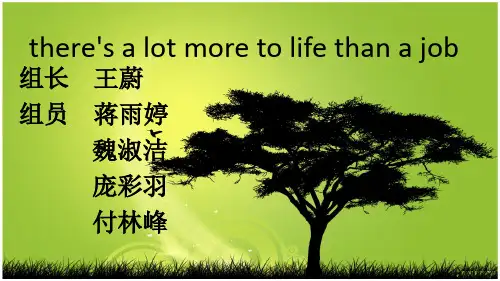
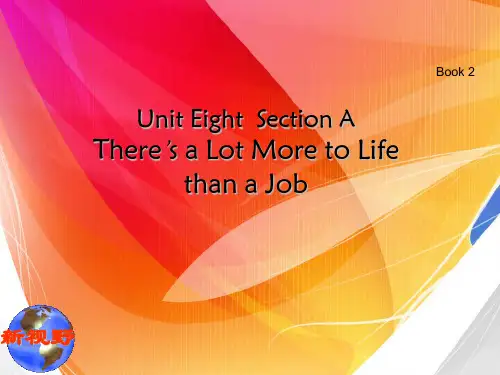
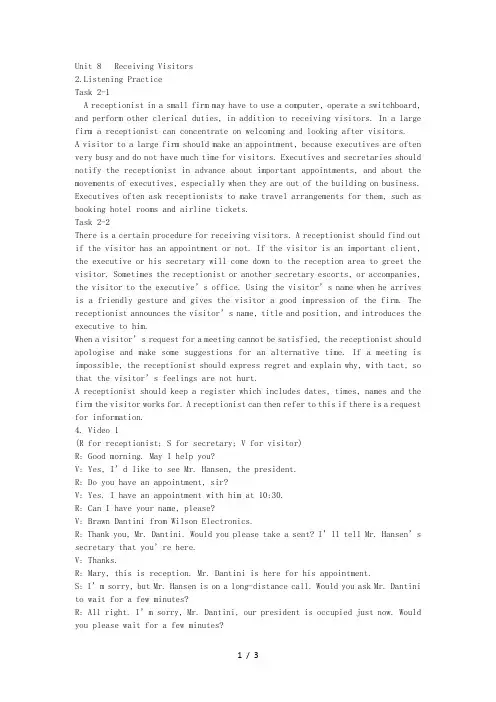
Unit 8 Receiving Visitors2.Listening PracticeTask 2-1A receptionist in a small firm may have to use a computer, operate a switchboard, and perform other clerical duties, in addition to receiving visitors. In a large firm a receptionist can concentrate on welcoming and looking after visitors.A visitor to a large firm should make an appointment, because executives are often very busy and do not have much time for visitors. Executives and secretaries should notify the receptionist in advance about important appointments, and about the movements of executives, especially when they are out of the building on business. Executives often ask receptionists to make travel arrangements for them, such as booking hotel rooms and airline tickets.Task 2-2There is a certain procedure for receiving visitors. A receptionist should find out if the visitor has an appointment or not. If the visitor is an important client, the executive or his secretary will come down to the reception area to greet the visitor. Sometimes the receptionist or another secretary escorts, or accompanies, the visitor to the executive’s office. Using the visitor’s name when he arrives is a friendly gesture and gives the visitor a good impression of the firm. The receptionist announces the visitor’s name, title and position, and introduces the executive to him.When a visitor’s request for a meeting cannot be satisfied, the receptionist should apologise and make some suggestions for an alternative time. If a meeting is impossible, the receptionist should express regret and explain why, with tact, so that the visitor’s feelings are not hurt.A receptionist should keep a register which includes dates, times, names and the firm the visitor works for. A receptionist can then refer to this if there is a request for information.4. Video 1(R for receptionist; S for secretary; V for visitor)R: Good morning. May I help you?V: Yes, I’d like to see Mr. Hansen, the president.R: Do you have an appointment, sir?V: Yes. I have an appointment with him at 10:30.R: Can I have your name, please?V: Brawn Dantini from Wilson Electronics.R: Thank you, Mr. Dantini. Would you please take a seat? I’ll tell Mr. Hansen’s secretary that you’re here.V: Thanks.R: Mary, this is reception. Mr. Dantini is here for his appointment.S: I’m sorry, but Mr. Hansen is on a long-distance call. Would you ask Mr. Dantini to wait for a few minutes?R: All right. I’m sorry, Mr. Dantini, our president is occupied just now. Would you please wait for a few minutes?V: Yes, of course.R: Would you like something to drink? Do you prefer coffee or tea?V: Thank you. Coffee, please.R: Would you like sugar and cream with your coffee?V: No, thank you. Just black.R: Here you are, Mr. Dantini. And there are some magazines if you’d like to read them.V: Oh, good. Thank you very much.S: Mr. Hansen is available now. Please send Mr. Dantini up.R: OK. Mr. Dantini, our president is available now. I’ll take you to his office and bring you some more coffee.V: Thank you very much.5. Language Focus B2. Task 1(P for Paula; G for Mr. Green)P: Excuse me, sir, but are you Mr. Green from Sydney?G: Oh, yes. My name is Brain Green. I’m the Purchasing Manager of the Sydney Garment Ltd. Corporation. And you are …?P: My name is Paula.G: How do you do, Paula?P: How do you do? I work at the Guangzhou Textiles Company. I’m secretary to the General Manager, Mr. Liu. I’m here to meet you on his behalf.G: Thank you very much for coming to meet me.P: My pleasure. Fine weather, isn’t it?G: Yes, it’s lovely. Real November weather, sharp and bright.P: Now let’s go and collect your luggage first. And after that I’ll accompany you to the Garden Hotel.G: OK, I’m in your hands. Let’s go.6. Video 2(J for Ms. Jones; L for Lin Hua; W for Miss.Wang)L: Ms. Jones?J: Yes, I’m Miranda Jones from Flora Garment Trading.L: My name is Lin Hua. I’m the Sales Manager for Baiyun Sweaters. How do you do, Ms. Jones?J: How do you do? It’s very nice of you to come to meet me.L: You’re welcome. And may I introduce my secretary, Miss Wang?J: Sure. It’s a pleasure to meet you, Miss Wang.W: The pleasure is mine. The flowers are for you, Ms. Jones.J: Oh, thank you. They’re beautiful! You’re very kind.L: How was your flight, Ms. Jones?J: Very nice. The service on board was superb. And I managed a few hours’ sleep, so I feel fine now.L: I’m glad to hear that. Oh, let me help you with your luggage.J: Thank you.L: Is this your first visit to China?J: No. But it’s my first visit to Guangzhou. I hope it won’t be my last.L: I hope you will have a pleasant stay here.J: I’m sure I will.L: Our car is our in the parking lot. Shall we drive to your hotel now?J: Yes, thank you. Let’s go.W: This way, please. Here we are, Ms. Jones. This is the White Swan Hotel. We’ve reserved a room for you on the 6th floor with a balcony overlooking the park. J: Thank you very much. It’s very considerate of you.W: Well, that’s the least we could do.L: This is your room, Ms. Jones. Is it OK?J: Oh, yes it’s lovely, very cozy and well-decorated! It’s really very thoughtful of you to have arranged if for me.L: Not at all.W: You must be very tired after your long trip. Is there anything else we can do for you?J: No, thanks. Not at the moment.L: Then we’ll be leaving now so that you can settle in. After all, we’ll have enough time for business during the next 3days.J: Thank you.L: You’re welcome. We’ll contact you tomorrow morning.J: See you then.L,W: See you!。
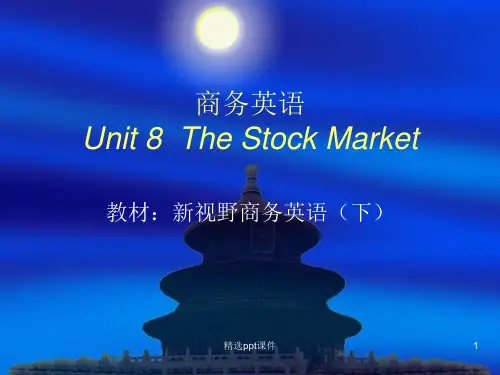
Unit 8 Receiving Visitors2.Listening PracticeTask 2-1A receptionist in a small firm may have to use a computer, operate a switchboard, and perform other clerical duties, in addition to receiving visitors. In a large firm a receptionist can concentrate on welcoming and looking after visitors.A visitor to a large firm should make an appointment, because executives are often very busy and do not have much time for visitors. Executives and secretaries should notify the receptionist in advance about important appointments, and about the movements of executives, especially when they are out of the building on business. Executives often ask receptionists to make travel arrangements for them, such as booking hotel rooms and airline tickets.Task 2-2There is a certain procedure for receiving visitors. A receptionist should find out if the visitor has an appointment or not. If the visitor is an important client, the executive or his secretary will come down to the reception area to greet the visitor. Sometimes the receptionist or another secretary escorts, or accompanies, the visitor to the executive’s office. Using the visitor’s name when he arrives is a friendly gesture and gives the visitor a good impression of the firm. The receptionist announces the visitor’s name, title and position, and introduces the executive to him.When a visitor’s request for a meeting cannot be satisfied, the receptionist should apologise and make some suggestions for an alternative time. If a meeting is impossible, the receptionist should express regret and explain why, with tact, so that the visitor’s feelings are not hurt.A receptionist should keep a register which includes dates, times, names and the firm the visitor works for. A receptionist can then refer to this if there is a request for information.4. Video 1(R for receptionist; S for secretary; V for visitor)R: Good morning. May I help you?V: Yes, I’d like to see Mr. Hansen, the president.R: Do you have an appointment, sir?V: Yes. I have an appointment with him at 10:30.R: Can I have your name, please?V: Brawn Dantini from Wilson Electronics.R: Thank you, Mr. Dantini. Would you please take a seat? I’ll tell Mr. Hansen’s secretary that you’re here.V: Thanks.R: Mary, this is reception. Mr. Dantini is here for his appointment.S: I’m sorry, but Mr. Hansen is on a long-distance call. Would you ask Mr. Dantini to wait for a few minutes?R: All right. I’m sorry, Mr. Dantini, our president is occupied just now. Would you please wait for a few minutes?V: Yes, of course.R: Would you like something to drink? Do you prefer coffee or tea?V: Thank you. Coffee, please.R: Would you like sugar and cream with your coffee?R: Here you are, Mr. Dantini. And there are some magazines if you’d like to read them.V: Oh, good. Thank you very much.S: Mr. Hansen is available now. Please send Mr. Dantini up.R: OK. Mr. Dantini, our president is available now. I’ll take you to his office and bring you some more coffee.V: Thank you very much.5. Language Focus B2. Task 1(P for Paula; G for Mr. Green)P: Excuse me, sir, but are you Mr. Green from Sydney?G: Oh, yes. My name is Brain Green. I’m the Purchasing Manager of the Sydney Garment Ltd. Corporation. And you are …?P: My name is Paula.G: How do you do, Paula?P: How do you do? I work at the Guangzhou Textiles Company. I’m secretary to the General Manager, Mr. Liu. I’m here to meet you on his behalf.G: Thank you very much for coming to meet me.P: My pleasure. Fine weather, isn’t it?G: Yes, it’s lovely. Real November weather, sharp and bright.P: Now let’s go and collect your luggage first. And after that I’ll accompany you to the Garden Hotel.G: OK, I’m in your hands. Let’s go.6. Video 2(J for Ms. Jones; L for Lin Hua; W for Miss.Wang)L: Ms. Jones?J: Yes, I’m Miranda Jones from Flora Garment Trading.L: My name is Lin Hua. I’m the Sales Manager for Baiyun Sweaters. How do you do, Ms. Jones? J: How do you do? It’s very nice of you to come to meet me.L: You’re welcome. And may I introduce my secretary, Miss Wang?J: Sure. It’s a pleasure to meet you, Miss Wang.W: The pleasure is mine. The flowers are for you, Ms. Jones.J: Oh, thank you. They’re beautiful! You’re very kind.L: How was your flight, Ms. Jones?J: Very nice. The service on board was superb. And I managed a few hours’ sleep, so I feel fine now.L: I’m glad to hear that. Oh, let me help you with your luggage.J: Thank you.L: Is this your first visit to China?J: No. But it’s my first visit to Guangzhou. I hope it won’t be my last.L: I hope you will have a pleasant stay here.J: I’m sure I will.L: Our car is our in the parking lot. Shall we drive to your hotel now?W: This way, please. Here we are, Ms. Jones. This is the White Swan Hotel. We’ve reserved a room for you on the 6th floor with a balcony overlooking the park.J: Thank you very much. It’s very considerate of you.W: Well, that’s the least we could do.L: This is your room, Ms. Jones. Is it OK?J: Oh, yes it’s lovely, very cozy and well-decorated! It’s really very thoughtful of you to have arranged if for me.L: Not at all.W: You must be very tired after your long trip. Is there anything else we can do for you?J: No, thanks. Not at the moment.L: Then we’ll be leaving now so that you can settle in. After all, we’ll have enough time for business during the next 3days.J: Thank you.L: You’re welcome. We’ll contact you tomorrow morning.J: See you then.L,W: See you!。